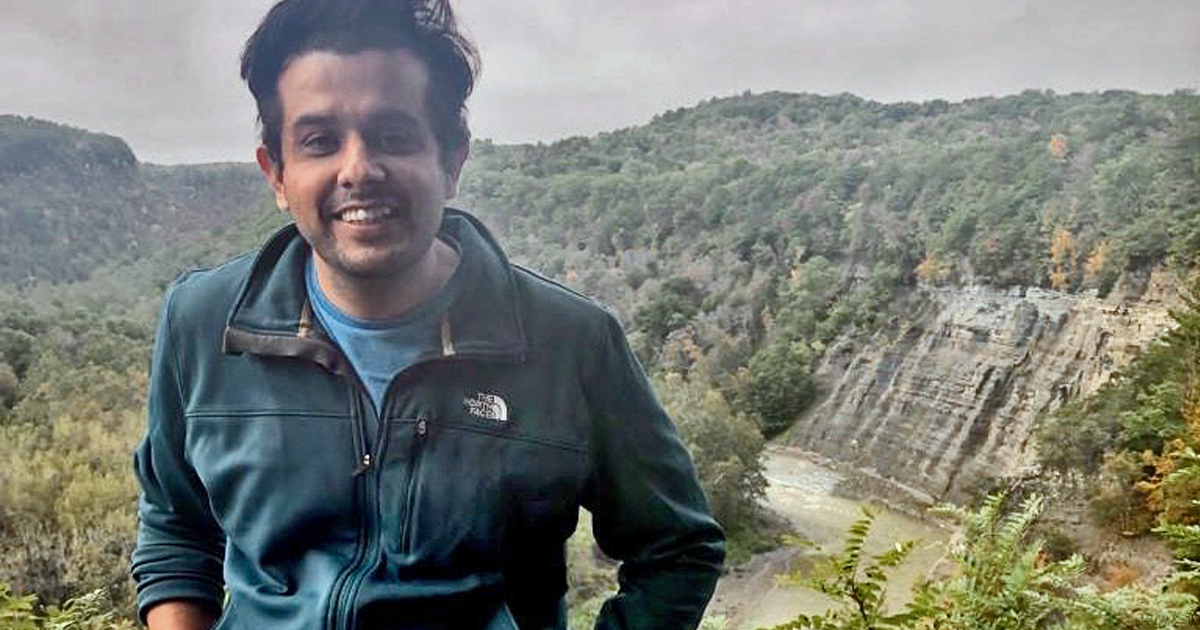
Sustainability and being conscious of one’s carbon footprint are on most people’s minds these days. For many that doesn’t end when they travel.
According to a 2022 survey by UN Intergovernmental Panel on Climate Change, more than 80 percent of responders believe sustainable travel is something that should be considered when deciding where to go.
It is not surprising then that Tanmay Sharma was hired in the fall when Plymouth State was looking for a new professor to teach tourism management and policy. Not only has the India-born Sharma lived and worked in a variety of countries, which adds international context to his current courses, but he also has worked in green tourism, which will bode well for future courses in PSU’s new sustainability major.
“All of my professional work has been in sustainability. That’s my passion,” says Sharma. “My dissertation (at Indiana University) was on sustainability hospitality. As a teaching assistant I taught green operations in hospitality every semester.”
Sharma’s experience, passion, and knowledge on the subject weren’t lost on the hiring committee, which included Director of the Office of Sustainability Brian Eisenhauser. “With Tanmay’s combination of industry and academic experience, we thought that he’s been on both sides of the field, and that is a quality that brings value to Plymouth State,” says Eisenhauer.
Eisenhauer and Sharma have already been working together to craft sustainability courses. “Green tourism is an area we have always been interested in for the program,” Eisenhauer continues. “We saw it as another way Tanmay can become engaged on campus. He was hired first for tourism, but we realized that he can help the sustainability program, too.”
Sharma’s interest in tourism began at an early age. His family traveled extensively, visiting different areas of India—from beaches to deserts to mountains. It was one of the major factors in his decision to attend a top Indian university to major in environment and sustainable development. Travel and experiencing different cultures continued when he went to King’s College in London for his master’s degree, followed by a formative opportunity at The Energy and Resource Institute (TERI), a well-known think tank.
Under TERI Director Dr. RK Pachauri, who received the Nobel Peace Prize on behalf of the Intergovernmental Panel on Climate Change in 2007 for its “efforts to build up and disseminate greater knowledge about man-made climate change,” Sharma worked on a tourism initiative in the Himalayas, managed a green hotel in New Delhi, and as a senior manager coordinator at the Burgan Oil Fields in Kuwait.
Sharma explained that the Kuwait project may not have been tourism or hospitality related but was an experience he couldn’t pass up. He was part of the work to clean up contaminated soil caused when Saddam Hussein set the oil fields on fire during the Gulf War in 1991.
“The job in Kuwait was great exposure to project management, and when working in tourism and hospitality, there is a lot of event management,” he says. “You have to deal with contractors and subcontractors who can either make you look good or bad. In Kuwait I realized how every word in a contract mattered.”
Sharma had not been to New Hampshire prior to his interview but he has since taken to the state’s natural beauty and has worked his surroundings into his classes. In Introduction to Travel and Tourism, for example, one of his students’ class projects is to consider how the Old Man of the Mountain still contributes to tourism—the second largest industry in the Granite State.
“I have had the good fortune to have many different cultural experiences,” Sharma says. “I tell my classes that cultural competence is good currency in our industry. It is something unique I bring to Plymouth State; not being from the US but bringing a global perspective.”

